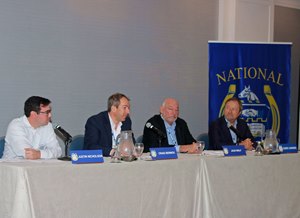At HBPA Convention, Ideas on Moving Sport Forward


Thoroughbred owner-breeder Craig Bernick has served on many horse racing boards, but one thing he sees as lacking in the industry is a vision on how to improve the economics of the sport.
Last year, Bernick founded the Thoroughbred Idea Foundation in an effort to craft and advocate ideas that can improve the sport's economic standing. As the keynote panel at the National Horsemen's Benevolent and Protective Association's convention March 13 in Clearwater Beach, Fla., Bernick and TIF board members Jack Wolf, a founder of Starlight Stables; Corey Johnsen, a co-owner of Arizona Downs and longtime track executive; and Justin Nicholson of racing and breeding operation AJ Suited Racing Stable outlined the ideas the group has put forward.
Bernick noted that many of the various groups in racing have boards that look out for advancing their corner of the sport, but he has noticed a lack of any group interested in advancing the sport overall, especially for gamblers and owners.
"The two customers who invest in the sport are owners and gamblers. So many of these boards are focused on themselves, their budget, carving out their slice of the pie. They don't necessarily get to how we're going to grow the business," Bernick said.
Oddly enough, Bernick believes that if more revenues could be brought into the sport through pari-mutuel wagering, or new ideas like fixed-odds wagering, many of the problems these other groups face would be addressed. While racing has seen percentage gains in wagering in each of the past three years, handle in 2018 was still down nearly $4 billion from a record-high $15.18 billion in 2003.
"If gambling on horse racing grows, all of the other issues are going to be easier to address," Bernick said.
With that in mind, TIF has put forward four white papers on how the sport can move forward with its economic model. The white papers include a call to put in place penny breakage, simplify rules on interference to a model more in line with most international jurisdictions, offer fixed-odds wagering in racing, and provide free handicapping data to horseplayers.
In terms of penny breakage, Bernick noted that the current system of rounding down winning payouts came about in an era where tracks didn't want pari-mutuel tellers counting pennies to winning players. With a move toward exotic wagers and wagering through advance-deposit wagering, Bernick said there's no longer a concern in that area.
Speaking to the horsemen in attendance, Bernick said any benefit from such breakage going to purses would be outweighed by increased handle.
"The churn that would be generated would benefit the industry way more than the rounding, some of which goes to purses," Bernick said. He estimated the change could generate $250 million in additional handle, keep horseplayers in the game longer, and create goodwill with bettors.
Bernick said some traction has been made on changing the interpretation of interference rules to the Category 1 standard that is in place in many international jurisdictions. Bernick said stewards have been given too difficult a task under current rules that ask them to determine whether a foul cost a horse a placing, while Category 1 requires stewards only to determine whether a foul allowed the horse who committed the foul to finish ahead of the horse who was hampered.
In terms of fixed-odds wagering, Bernick said pari-mutuel wagering has been great for racing for many years, but with states approving sports wagering, racing will have a better chance of attracting these bettors with a fixed-odds model—the standard in place for sports betting. For current horseplayers, last-second odds changes before the gates open have been frustrating—making it difficult to find the value in a race.
Speaking on a later panel, TIF executive director Pat Cummings said sports gamblers will be frustrated by needing to wait until a race goes off before actually knowing the odds.
Johnsen said fixed-odds wagering could be one of the ways the sport makes emerging sports wagering a positive.
"Mark Cuban believes sports betting will double the value of sports franchises. It will change how consumers look at our business, and hopefully represents an opportunity," Johnsen said. "Horse racing is the best thing to gamble on, way more races, 100 times more than football games. More opportunities, if we rise to the occasion, we can grow from sports wagering. But if we think we're just going to keep going the way we are, sports wagering is going to run us over."
Bernick said if Equibase moves to a model that provides basic handicapping information for races at the same time entries are released, it will generate more wagering interest in the sport. He said providing this information to potential bettors should be viewed as a marketing expense that will help increase handle.
Bernick said new horseplayers face a lot of expense in getting started, and too many of these players are leaving for other interests.
"Horse racing is way more expensive than other sports and entertainment options," Bernick said.
National HBPA CEO Eric Hamelback said in a fast-changing landscape—as legal sports wagering emerges in states—horsemen need to be open to new ideas.
"We certainly have to be able to look at opportunities for change and embrace some things that we've never done before," Hamelback said. "What (TIF) has done and what they're doing—their mission to make us think—is certainly getting the point across."
Wolf hopes the ideas TIF has put forward become reality.
"The proof is going to be in the pudding," Wolf said. "We're going to have to find ways to execute these changes and get the industry to agree that these topics need to be addressed. Horsemen could be very instrumental in creating change."
